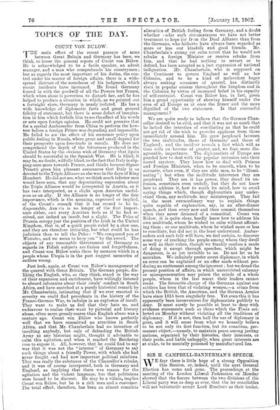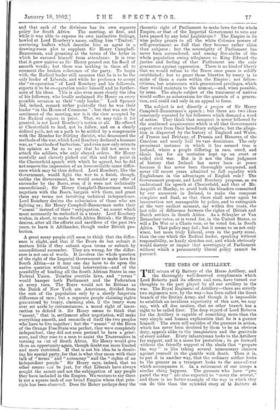SIR H. CAMPBELL-BANNERMAN'S SPEECH.
WE fear there is little hope of a strong Opposition this Session, or, indeed, until the next General Election has come and gone. The proceedings at the meeting of the London Liberal Federation on Monday showed that the fissure between the two divisions of the Liberal party was as deep as ever, that the ire coucilables will not voluntarily accept Lord Rosebery as their leader. and that each of the divisions has- its • own separate policy for• South Africa. The meeting, at first, and while it was able to express its oft instinctive feelings, howled at Lord Rosebery's name, calling him "Traitor," scattering leaflets which describe him as agent in a drawing-room plot to • supplant Sir Henry Campbell- Bannerman, and groaning at the tends of the letter in which he excused himself from attendanca. It is true that it grew quieter as Sir Henry poured out his flood of smooth words ; but there was nothing in them all td recernent the broken coherence of the party. • To begin with, the Radical leader still assumes that he is to be the only leader of Liberals, and while he professes to accept the " co-operation " of Lord Rosebery and his followers, expects it to be co-operation under himself and in further- ance of his ideas. This is also even more clearly the idea of his followers, who loudly acclaimed Sir Henry on every possible occasion as their "only leaden". Lord Spencer did; indeed, remark rather pointedly that he was their leader "in the House of Commons " ; but that was not the sentiment of the meeting, nor is it the view accepted by the Radical organs in print. That, we may take it for granted, is not Lord Roseberv's notion at all. He offered at Chesterfield to lead, not 'to follow, and on a clearly defined path, not on a path to be settled by a compromise with the Member for Stirling district, who denounced the methods of the war, which Lord Rosebery declared a humane war, as "methods of barbarism," and even now only retracts his opinion so far as to say that he did not mean to attack the soldiers, who only obeyed orders. Sir Henry carefully and cleverly picked out this and that point in the Chesterfield speech with which he agreed, but he did not remove the impression of an irreconcilable inner differ- ence which may be thus defined. Lord Rosebery, like the Government, would fight the war to a finish, though, unlike the Government, he would consider any offer of surrender by the Boers, even if it were not technically unconditional ; Sir Henry Campbell-Bannerman would negotiate with the Boers, bargain with them, and grant them any terms not involving technical independence. Lord Rosebery desires the submission of those who are fighting us ; Sir Henry Campbell-Bannerman seeks their " assent " instead of their "subjugation," an assent which must necessarily be embodied in a treaty. Lord Rosebery wishes, in short, to make South Africa British ; Sir Henry desires, after all the efforts and sacrifices of the past two years, to leave it Afrikander, though under British pro- tection.
A great many people still seem to think that the differ- ence is slight,- and that if the Boers do but submit it matters little if they submit upon terms or submit by unconditional surrender. They are wrong, for the differ- ence is not one of words. It involves the whole question of the right of the Imperial Government to make laws for South Africa—as it may one day have to do upon the native question without local intervention—and of the possibility of binding all the South African States in one Federal Union. Treaties override laws, and. " terms " would hamper both Parliament and the Federation at every turn. The Boers would not be Britons as the Dutch of New York are Americans, divided from the rest of the population only by a slowly forgotten difference of race; but a separate people Claiming rights guaranteed by treaty, claiming also, if the treaty were ever set aside by circumstances,- a moral right of insur- rection to defend it. Sir Henry seems to think that "assent," that is, settlement after negotiation, will make everything smooth, arid reconcile of itself the two peoples wise have to live together but the- " assent " of the Boers of the Orange Free State wazi perfect, they Were completely independent, they did not even. pretend to have a •grieV- ance; and they rose to aman to assist the Trafisvattlers iii turning us 'rut .of SOuth Africa. Sir Henry would give them an opportunity again, though -doubtless More limited and more restricted. If that is not his idea he is deceiv- ing- his special-party, for that is what they mean with their talk cif: " terms " autanoiny'r and the " rights of an independent- people." - Sir Henry says, 'indeed that no other course can be just, for that Liberals have always sought the assent and not the subjugation Of 'any people they have included inthe Empire. . We venture to say there is not a square inch of our broad Empire where that prin- ciple has been observed. Does Sir 'Henry perhaps deny the theoretic right of Parliament to make laws for the whole Empire, or that of the Imperial Government to veto any laws passed by any local Legislature ? The Empire in its wise policy grants to all the white Colonies powers of self-government so full that they become rather allies than subjects ; but the sovereignty 'of Parliament has never been surrendered, and among five-sixths of the whole population owing allegiance to King Edward the justice and. feeling of that Parliament are the only ,,o-uarantees against oppression. There is no kind of liberty that we would refuse to the Boers once peace is solidly established ; but to grant those liberties by treaty is to make of them a caste within the Empire ; not fellow- citizens, but aristocrats with guaranteed privileges, which they would maintain to the utmost,—and, when possible, by arms. The single subject of the treatment of natives would suffice as substratum for the quarrels of a genera- tion, and could end only in an appeal to force.
The subject is not directly it propos of Sir Henry Campbell-Bannerman's speech ; but there are two ideas constantly repeated by his followers which demand a word of notice. They think that conquest is never followed by the continued acquiescence which is all that Governments expect even from their hereditary subjects ; but the allega- tion is disproved by the history of England and Wales, of France and Brittany, of Prussia and Hanover, of the Czardom and nearly half its vast dominions. The only prominent instance in which it has seemed true is Ireland, where a people differing in race, creed, and ideals has for six centuries kept up an overt or veiled civil war. But is it not the clear judgment of history that Ireland has never been at peace because it has never been thoroughly conquered, and never till recent years admitted to full equality with Englishmen in the advantages of English rule ? The Government propose, and Lord Rosebery proposes, as we understand his speech at Chesterfield, and that of Mr. Asquith at Hanley, to avoid both the blunders committed by our ancestors in Ireland, to make the conquest complete and final, so that there shall never again be insurrection not manageable by police, and to extinguish at the very earliest moment, say within five years, the last relic of difference between the rights of British and Dutch settlers in South Africa. As a Schuyler or Van Rensselaer votes, or is voted for, in the -United States, so will a Be Wet or a Cloete vote, or be voted for, in South Africa. That policy may fail ; but it seems to us not only wiser, but more truly Liberal, even in the party sense, than the one which the Radical leader, speaking without responsibility, so hazily sketches out, and which obviously would destroy or impair that sovereignty of Parliament without which a permanently liberal policy cannot be pursued.







































 Previous page
Previous page